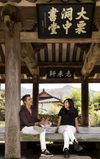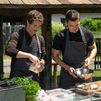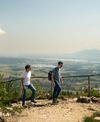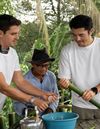
Antoni Porowski: “When I travel, food is everything”
By Kate Bussmann
February 2025
In his new travel series No Taste Like Home, Queer Eye’s Antoni journeys with six superstars as they explore their heritage through food. And, he tells us, there are surprises all round
As the resident foodie on Netflix’s Queer Eye, it’s no surprise that when it comes to travel, Antoni Porowski only ever has one thing on his mind. “When I travel, food is everything,” he says. “I’m terrible at taking photos. I have really severe ADHD and can’t last long in a museum. But experiencing a culture through its food... I just don’t see any other way of doing it. That’s been ingrained in me since a very early age: Wherever we traveled, even to an all-inclusive resort, my parents would find a local restaurant, and we’d come home with spices or ingredients—those are the memories that stick.”
His new docuseries for National Geographic, No Taste Like Home, joins a lauded tradition of culinary travel shows. But as well as showcasing delicacies from around the world, this one stirs in a very on-trend ingredient: genealogy.

Porowski in Italy. Photo: National Geographic/Rebecca Eishow
In each episode, Porowski travels with a celebrity to the homeland of their ancestors, where they build a deeper connection to their culture—and uncover family secrets—through the prism of food. Guests include Issa Rae (pictured top), Florence Pugh, Justin Theroux and Awkwafina, and its blend of gastronomic adventure and heritage travel makes for some genuine goosebump moments.
But Porowski, too, has his own story to tell. His mother was born in Poland, his father in Brussels, and growing up first in Montreal and later in West Virginia, Polish was his first language. “When I was young, going to Poland always made me feel like a bit of a fake—I had a Polish name, but I didn’t speak with as clean an accent,” he recalls. Back home in the U.S., “I just wanted to be accepted with my weird name and different clothing. For years, I tried to minimize my Polish heritage to fit in. But food always stayed. We made sure to have Polish food all the time, and the dishes stayed with me.”

And… action! The 2025 Set-Jetting Forecast
The hottest film and TV locations, from Squid Games to Wednesday
He believes that for the growing numbers interested in heritage travel—a sector expected to double over the next decade to $1.3bn—food is an underrated piece of the puzzle. As one expert on the show says, for immigrants, after clothing and language, food is the last thing to go; that’s what people hold onto. Why? “Because food is community,” says Porowski. “The family kitchen is the heart of the home. It’s where the love is. It’s everything.”
Read on for a taste of each episode—and Porowski’s hotel picks.
Issa Rae’s spiritual journey to Senegal

Porowski with Issa Rae, helping to prepare a traditional Senegalese dish

Beach time in Dakar. Photos: National Geographic/John Wendle
For actor, writer and producer Issa Rae, who came to fame with Insecure, this wasn’t her first visit to stunning Senegal. “But what I learned quickly is that it was kind of like my experience visiting Poland as a kid: You’ve got to go and see the aunties, so you don’t really go to cultural spots or explore,” says Porowski. Set against Dakar and Saint-Louis’ stunning beaches, bright fishing boats, and buzzy markets, there are profound moments of discovery about Rae’s family history, of healers, rebels, and royals, over shared meals, often with everyone eating from one large bowl.
The Senegalese concept of teraanga—generosity, hospitality and sharing—is something that stuck for Porowski, who has recently been made a Goodwill Ambassador for the UN World Food Program. “I was struck by the resilience of the people—they smile so much more than a lot of New Yorkers. I’d take any excuse to go back to Senegal.” (Take a street food tour of Dakar.)
Florence Pugh’s English eye-opener

In the Yorkshire countryside with Florence Pugh

Yorkshire puddings: a revelation. Photos: National Geographic/Chris Raphael
From day one of filming with Oppenheimer star Florence Pugh, in the kitchen of the Michelin-starred Black Swan at Oldstead on the edge of the North York Moors, Porowski was in love. “She picked up the lamb and was tearing into it—no fork or knife, just unabashed joy,” he laughs. Her family’s passion for food is evident in their battles over how to make a shepherd’s pie—and in the episode’s revelation that an ancestor found huge success cooking just the type of lamb she’d enjoyed in that Yorkshire pub kitchen. But Porowski was also in for a surprise.
“There’s a stigma that British food isn’t good, but everyone is so wrong. It was the first time I had a proper Yorkshire pudding, and I don’t mean to be dramatic, but it changed my life,” he enthuses. The English countryside also won a new fan. “The sheep running around, the rolling hills, the foggy mistiness—it was so poetic and romantic and beautiful. I just loved it.” (Take a tour of York’s food scene.)
Justin Theroux’s Italian adventures

With Justin Theroux, learning to make tortellini in brodo

At famed restaurant Locanda del Falco in Rivalta. Photos: National Geographic/Rebecca Eishow
Tortellini in brodo, a dish cooked by actor and screenwriter Justin Theroux’s Italian grandmother, provides the essential clue to a fascinating detective story in this episode. Family lore held that the Beetlejuice Beetlejuice star’s great-grandfather hailed from handsome, historic Piacenza in Emilia-Romagna—a “culinary colossus” of a region, birthplace of bolognese, balsamic vinegar, parmigiana and more. But as Porowski reveals, that dish tells another story entirely.
“To learn that the type of pasta—the way that it’s crimped, and what it goes into—can tell you exactly what village you’re from is beyond fascinating to me,” he marvels. “I know the rules and break them; I’ll throw peas into a carbonara. But it makes you understand why they’re so strict: That’s how they continue to pass on these dishes from generation to generation.” Along the way, he and Theroux explore the region’s rolling countryside, cook with locals (book your own lesson in Ferrara), and fish for clams from the clear waters of the Po Delta.
Awkwafina’s Korean soup for the soul

Antoni Porowski and Awkwafina in Daeyul-ri, South Korea

A lesson in kimchi. Photos: National Geographic/Seong Joon Cho
Comedian and actress Awkwafina (real name Nora Lum) hadn’t been back to South Korea since her mother’s funeral when she was four years old. “And, understandably, she had so much anxiety,” says Porowski. The Crazy Rich Asians star’s journey to busy, culinarily diverse Seoul, and then south to the smaller city of Daegu, is a deeply moving one, and food proves to be a gentle but powerful way for her to connect with her late mother. She learns about her family history and meets her mom’s friends, who help her learn to make kimchi, a skill typically taught by mothers to their daughters (visitors can also join a class to learn).
But it is an experience making seaweed soup that brings everyone to tears. “It’s poetic: You take big, beautiful sheets of kelp and plump them up in water, then add beef and sesame oil. As we were preparing it, Nora realized that the one thing she remembered her mom making for her was the dish she was making at that moment. I felt like she was going to emotionally explode,” he recalls. “We learned that mothers would have this after they gave birth, or when they were trying to feel better. Everyone was crying. It was an incredible moment, just so beautiful.”
James Marsden’s Texan German cook-up

A schnitzel-making session with James Marsden. Photo: National Geographic/Rebecca Eishow

Taking a hike in Bavaria. Photo: National Geographic/Bernd Schuller
In the episode starring James Marsden, known for roles in blockbusters including X-Men, the actor connects the dots between the beloved chicken-fried steak his mom makes in Texas and the schnitzel Porowski cooks with him in Germany, the land of her heritage. Along the way, they cycle the pretty streets of Hanover, climb the hills of Bavaria with its fairy-tale castles, enjoy a brew in an authentic beer garden, and come full circle with a visit to the expert barbecue pitmasters back home.
“If I’m honest, the schnitzel was a little obvious to me,” admits Porowski, “but what was less obvious was the relationship between German immigrants, who were excellent butchers, and freed slaves, who could cook meat to perfection over a fire. They formed a wonderful bond, and started what we know today as barbecue.” (Try it for yourself on a barbecue tour in Austin.)
Henry Golding’s Malaysian voyage

Filling bamboo with rice at Pematoh Longhouse. Photo: National Geographic/Rebecca Eishow

Buah maram, lemongrass, torch ginger and other ingredients. Photo: National Geographic/Annice Lyn
Growing up in England with a British father and Malaysian mother, actor Henry Golding—star of hit movies including Crazy Rich Asians—felt stigma around his Eurasian heritage. So, when he traveled with Porowski to his mom’s homeland of Sarawak on the island of Borneo, with its wide rivers and jungle-covered hills, it was about reclaiming a sense of pride. “Henry actually knew a lot about his background—he had been to the ‘long houses’ as a kid, and he’s even done documentaries on his Iban heritage,” says Porowski. But this trip, with its focus on the unique cuisine of the region, brought a deeper connection.
They met proud and passionate locals, like a young maker of traditional tuak (rice wine), and cooked with plants only found there. “I’ve never tried so many things that were unlike anything else,” he says. “One of the gifts of traveling is making yourself uncomfortable—like getting your shots. But you’ll carry the things you gain with you for the rest of your life.” (Plan a visit to this remote region here.)

Kate Bussmann is an editor at Expedia Group, covering all aspects of culture and style. She has hosted live and online events, written and edited for titles including The Times, The Telegraph, InStyle, Glamour, and Marie Claire, and appeared on NPR, the BBC and Sky News. She has lived in London, New York and Naples, and one day plans to move to Paris.
